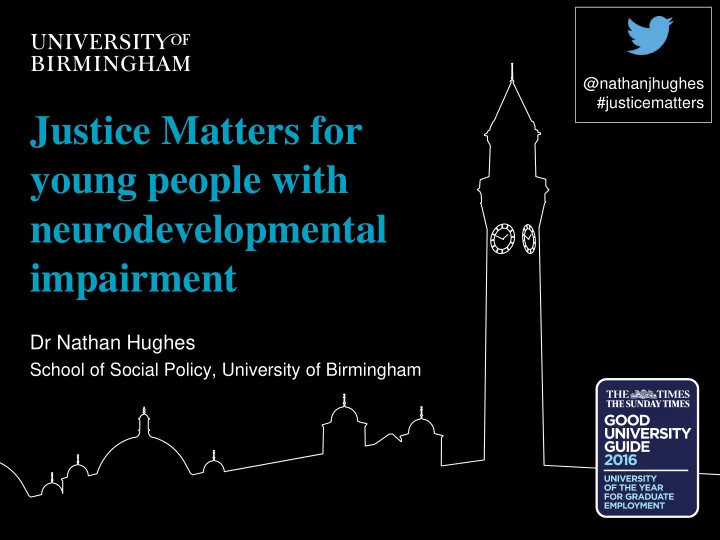

@nathanjhughes #justicematters Justice Matters for young people with neurodevelopmental impairment Dr Nathan Hughes School of Social Policy, University of Birmingham
Definitions Childhood neurodevelopmental impairment: physical, mental or sensory functional difficulties caused by disruption in the development of the nervous system, such as: o cognitive or executive functioning deficits; o communication difficulties; o difficulties in regulating and expressing emotions, or understanding the emotions of others.
Definitions Neurodevelopmental disorders : ‘a group of conditions… [which] typically manifest early in development, often before the child enters grade school, and are characterized by developmental deficits that produce impairments of personal, social, academic, or occupational functioning.’ (APA, 2013) Such disorders include: o intellectual / learning disability; o attention-deficit / hyperactivity disorder; o specific learning disorders, o autism spectrum disorder; e.g. dyslexia; o communication disorders; o fetal alcohol spectrum disorder.
Definitions ‘Neurodisability describes a group of congenital or acquired long - term conditions that are attributed to impairment of the brain and/or neuromuscular system and create functional limitations.’ (Morris et al, 2013: 1103) o ‘Medical model’ - conflating disability and impairment?
Lead Authors: Dr Nathan Hughes (Senior Lecturer in Social Policy, University of Birmingham) Prof Huw Williams (Director of the Centre for Clinical Neuropsychology Research, University of Exeter) Dr Prathiba Chitsabesan (Consultant Child and Adolescent Psychiatrist, Pennine Care NHS Foundation Trust)
Prevalence of neurodevelopmental disorders (Hughes et al, 2012) Prevalence Prevalence Neurodevelopmental Definition among young among young disorder (based on APA, 2013) people in general people in population custody Deficits in: cognitive capacity (IQ less than Learning / Intellectual 2 - 4% 23 - 32% 70); and adaptive functioning (significant Disability difficulties with everyday tasks) Problems with speech, language or hearing Communication that significantly impact upon an individual's 5 - 7% 60 - 90% academic achievement or day-to-day social Disorders interactions. Attention-Deficit / Persistence in multiple symptoms of 1.7 – 9% 12% Hyperactivity Disorder inattention, hyperactivity and/or impulsivity Qualitative abnormalities in reciprocal social Autistic Spectrum interactions and communication, and markedly 0.6 – 1.2% 15% Disorder restricted repetitive and stereotyped patterns of behaviour and interests Characteristic facial features, below average height and weight, and a varied combination Foetal Alcohol 0.1 – 5% of behavioural and developmental dysfunction, 10.9 - 11.7% Spectrum Disorder including hyperactivity, learning difficulties, poor social skills, and emotional dysregulation.
Prevalence of traumatic brain injury (Hughes et al, 2015) Prevalence among Prevalence among young Nature of TBI young people in general people in custody population 24 – 42% 49 – 72% Any head injury Head injury resulting in loss of 5 - 24% 32 - 49.7% consciousness Head injury resulting in loss of 5% 18.3% consciousness for 20 minutes or more 9.2 – 12% 45 – 55% More than one head injury
Repeated calls for policy and practice refom
Criminalising disability o A failure of criminal justice agencies to identify and appropriately support young people with neurodevelopmental impairments o A failure to therefore uphold articles 37 and 40 of the United Nations Convention on the Rights of the Child o Barriers to effective engagement in legal processes, including forensic police interviews and formal courtroom procedures o Criminal justice interventions assume verbal and cognitive competence, bringing greater risk of breach and failure of intervention to address causes of behaviour
Criminalising disability This is inherently tautological: the failings of the system to effectively support these young people so as to prevent re-offending reinforce their involvement with the system and its continued failure to do so, resulting in a higher subsequent risk of eventual custodial intervention. Hughes, N. (2015) ‘I would build… comprehensive school and family support systems for young people with neurodevelopmental impairments’, Centre for Criminal Justice Studies, London: CCJS.
Symptoms and experiences related to Risk factors for childhood aggressive neurodevelopmental impairment and antisocial behaviour Executive functioning deficits Reactive aggression Poor theory of mind Poor emotional literacy Social communication difficulties Poor emotional regulation Difficulties with abstract reasoning Poor cognitive empathy Impulsivity High arousal Bullying and victimization Failure to recognize consequences of action Heightened susceptibility to peer influence Educational disengagement
Thinking differently to prevent justice involvement o Shifting resources away from custodial intervention to invest in family support, and specialist health and educational services o Train practitioners working in education, family support, social services and primary care settings to recognize and understand issues related to neurodevelopmental impairment o Earlier identification of impairments through routine assessment in the education system following early signs of difficulty o Information sharing between health, education and other services o Greater support and information to families to enable them to maintain an effective and consistent level of care to their child
Behavioural problem or ‘skill deficit’? Young people with neurodevelopmental impairments are prone to diagnosis of behavioural problems rather than cognitive impairments: ‘What manifests in the classroom as a ‘behaviour problem’ (e.g. failure to negotiate appropriately with other children around access to equipment) may in fact be more appropriately described as a skill deficit , i.e. an inadequate repertoire of socially sanctioned linguistic skills to enable prosocial engagement with others and attainment of goals.’ (Law et al, 2013)
Thinking differently to prevent justice involvement o Shifting resources away from custodial intervention to invest in family support, and specialist health and educational services o Train practitioners working in education, family support, social services and primary care settings to recognize and understand issues related to neurodevelopmental impairment o Earlier identification of impairments through routine assessment in the education system following early signs of difficulty o Information sharing between health, education and other services o Greater support and information to families to enable them to maintain an effective and consistent level of care to their child
Contact details Email: n.j.hughes@bham.ac.uk Twitter: @nathanjhughes Web: bham.academia.edu/NathanHughes/ Google: nathan hughes academia
Recommend
More recommend